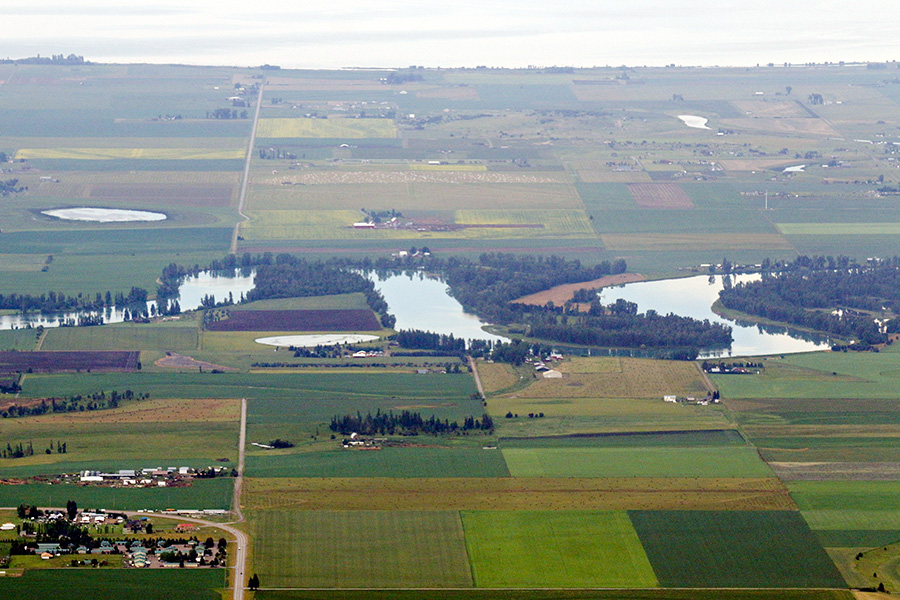Investigation Determines Bottling Plant Legal in Zoning District
County planning department says Montana Artesian Water Company is grandfathered into new zone; opponents disagree
By Tristan Scott
Following a months-long investigation, Flathead County planning officials on Jan. 4 ruled that a controversial water bottling plant near Creston is grandfathered into a newly expanded zoning district that precludes commercial and industrial facilities, much to the chagrin of neighboring landowners who have mounted strong opposition to the plant.
Since July, county planning officials have been investigating two complaints filed in June alleging zoning violations against Montana Artesian Water Company, a water-bottling plant started by Egan Slough landowner Lew Weaver. Weaver received a permit from the Department of Natural Resources and Conservation that would allow his company to produce up to 140,000 water bottles per hour, 24 hours a day, seven days a week. The water right would allow Weaver’s company to receive 710 acre feet of water annually, equaling roughly 1.2 billion 20-ounce water bottles.
Neighbors to the bottling facility have publicly raised concerns on multiple legal fronts, filing two complaints in an effort to prevent the facility from beginning production.
In 2016, a group of landowners asked the Flathead County Commission to expand the Egan Slough Zoning District, a designation created in 2002 to preserve the land’s agricultural character. The zoning district prohibits some industrial uses and limits new parcels to no less than 80 acres.
Despite hearing testimony from dozens of residents who supported the zoning expansion, the commission rejected their request, prompting the landowners to sue the county and lead a charge to qualify a ballot initiative.
Passing overwhelmingly with 70 percent of the vote, the ballot measure expanded the 1,150-acre Egan Slough Zoning District to include an additional 530 acres. Land added to the district now includes the site of Weaver’s bottling facility, which isn’t in full production but is capable of producing about 30 gallons a minute — a violation of the zoning district’s requirements, according to neighbors who filed a complaint with Flathead County officials.
But according to the report by the Flathead County Zoning and Planning Department, the facility is a “legal, nonconforming use” because Weaver obtained a building permit prior to the zoning district’s expansion.
“Montana Artesian may operate the water bottling facility to an extent consistent with the State of Montana Building Permit, Flathead City-County Health Department Septic Permit, DEQ Public Water Supply Permit, State of Montana Permit to Appropriate Water, Wholesale Manufacturing License, and other associated permits,” according to the Flathead County Planning and Zoning report.
The landowners behind the creation of the expanded district disagree.
Jack Tuholske, an attorney for Yes! For Flathead Farms and Water, the group at the vanguard of efforts to stymie the bottling plant, disputed the findings, saying legal precedent clearly supports his case. He said Weaver’s facility hadn’t begun production at the time of the zoning district’s expansion.
“What is grandfathered in is what existed on the date the initiative became law. And as of the date the initiative became law, Montana Artesian Water Company had a building and some permits, but did not possess the equipment to commercially bottle the water, and had not commercially bottled the water,” Tuholske said. “They could not have commercially bottled the water, and they did not possess all the permits to commercially bottle water. They are not grandfathered in to conduct the full-blown bottling operation.”
Darryl James, a spokesperson for Montana Artesian Water Company, said production had begun prior to the certification of the ballot initiative, including the assembly of equipment and the receipt of regulatory permits. James said the county’s ruling aligned with what Weaver has maintained all along — that he and his company followed all the proper regulatory channels to obtain the required permits.
“The County’s Report was pretty straight-forward. They confirmed what we have been stating for many months, quite simply that the MAWC facility must be viewed as a pre-existing use under a clear reading of the law and the local zoning regulations,” James wrote in an emailed statement. “We appreciate the County’s dispassionate review of the facts and the law, and are hopeful that MAWC can move forward in demonstrating that the facility can operate as a good neighbor without impact to wells or general quality of life in the Egan Slough area.”
The Flathead County commissioners are expected to respond to the planning department’s findings after reviewing the report.
Although unclear how Yes! For Flathead Farms and Water intended to move forward procedurally, Amy Waller, who founded the group, said it would continue to challenge the facility’s legality.
“We disagree with the County’s report that the bottling plant is grandfathered in,” she wrote in an emailed statement. “We think the County Planning Department’s determination that the bottling plant is an acceptable non-conforming use is incorrect, and we will continue pressing the issue in court.”